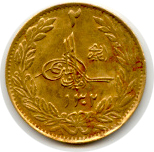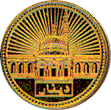Just before the Organisation of Islamic Conference which is due to
take place in Kuala Lumpur in October 2003 a number of Muslim countries,
led by Malaysia, propose to introduce an electronic unit of value called
a gold dinar to settle bilateral trade among themselves. The plan will
be rubbished by members of the Bush administration who were brought
up from birth to believe in the power of the almighty dollar, but the
White House should reflect on the fact that there are 1.3 billion Muslims
in the world and very few of them share America’s view of the dollar.
Moreover Asia was developing as an economic power house in its own right
until the financial crisis of 1997/8 and many leaders in these countries
believe that they were destabilised by an overly strong dollar.
Nor Mohamed Yakcop, the economic adviser to Malaysia’s Prime Minister
Mahathir Mohamad, announced the plan to an international conference
in the last few days and the intention is to introduce it half way through
next year. The idea may be in its infancy at the moment, but as Mao
Tse Tung said, “A long journey starts with a single step.” The great
appeal, not only in Asia but in the Middle East as well, is that it
would offer Islamic countries a means of by- passing western currencies
by using gold to settle bilateral trade. All these countries still retain
the concept of gold as a store of value as evidenced by Indian wedding
rites, purchases of gold by Thai farmers after good harvests and the
number of shops selling bullion in Dubai.
America finds it hard to comprehend the resentment in these countries
against the sheer power it wields in the world and this is exemplified
in the dollar. If the conspiracy theorists are to be believed immense
efforts have been made during the 90s by US banks and other institutions
to detach gold from the global financial system and spin it off as a
barbaric relic. Now the dollar is under pressure and the scales are
falling from the eyes of those who put total faith in the paper IOUs
of governments. Islam could not have chosen a better moment to offer
an alternative currency.
The Malaysian Prime Minister views matters in a fairly simplistic way.
Currently most world trade is settled using major currencies. The dollar
has predominated and it has been followed by the pound sterling, yen
and euro. The economies of the countries of the Middle East and Asia
have been vulnerable to the exchange rate between their local currencies
and these majors. "The gold dinar could be an important facilitating
mechanism to help the smaller countries of the world move away from
an inherently unstable and ultimately unjust global monetary system,"
he said.
Central to the proposed plan is the requirement that central banks
in member countries would settle dinar trade balances every three months
by transferring the beneficial ownership of gold held in a custodian
bank, such as the Bank of England. These central banks would then settle
with exporters and importers in the local currency. According to Islamic
law, the dinar is a specific weight of gold equivalent to 4.22 grams
of pure gold (0.135 ounces) and its value is based on world demand for
gold which would give it a value of US$42 at the moment..
Prime Minister Mahathir’s plan coincided with an announcement from
the World Gold Council that Asia's reserve-rich central banks are potential
buyers of gold to diversify their reserve assets. At the moment , according
to Ralston Thiedeman, head of the WGC’s Asia Pacific sector, Asia holds
over half of the world's near US$2.0 trillion of foreign exchange reserves
and it is mostly held in low-yield U.S. dollar assets, and generally
less than five percent in gold. Thiedeman said volatility in global
financial markets, a weakening U.S. dollar and low U.S. interest rates
were reasons for Asian central banks to diversify their portfolios.
He might almost have been reading from the same hymn sheet as Mahathir
Mohamad and it might therefore be realistic to suppose that these countries
might be gearing up their gold reserves to support the dinar.
One can see the world weary veterans of the derivative markets who
thought the bear market in gold would go on for ever shrugging their
shoulders at such an idea, but they forget the wild card – China. Its
basic industries such as steel are going gangbusters while the western
world is in recession and the Bank of China is steadily increasing its
gold reserves which still only amount to around 2 per cent of total
reserves. Just suppose it decided to hook into the gold dinar idea.
The balance of economic power might then shift from the west to the
east. Such a move would take time, but it is a thought worth mulling
over on the beaches this summer. As the man said, “Post September 11th
things will never be the same again.”.
 THE GOLD DINAR RESEARCH GROUP
THE GOLD DINAR RESEARCH GROUP 